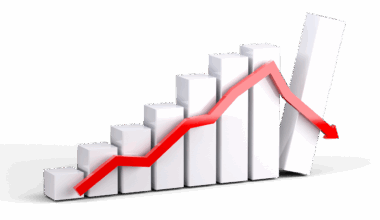How Inflation Influences Consumer Behavior and Market Trends
Inflation is a crucial economic indicator that profoundly influences the purchasing power of consumers. It causes prices of goods and services to rise, impacting everyday financial decisions. As inflation increases, consumers often adjust their purchasing behavior to cope with the higher costs. This adjustment can involve buying less, seeking alternatives, or prioritizing essential items over discretionary spending. Furthermore, inflation can lead to a decrease in consumer confidence, prompting households to save rather than spend. Such behavior affects overall market demand and can contribute to a slowdown in economic growth. Businesses that anticipate inflation must adjust their pricing strategies to maintain profit margins while still attracting customers. This scenario often leads companies to increase prices, further perpetuating the cycle of inflation. Monitoring inflation trends can help businesses anticipate consumer behavior changes, allowing them to make informed decisions about inventory management and marketing strategies. Overall, understanding how inflation affects consumers and markets is essential for making informed investment choices and economic forecasts, benefiting investors looking to navigate fluctuating markets effectively.
The Impact of Inflation on Spending Habits
Consumer spending habits shift in response to inflation rates. As prices rise, individuals become more selective about their purchases, often focusing on necessities rather than luxuries. This shift can significantly influence various sectors, from retail to services. For instance, in periods of high inflation, categories such as groceries, healthcare, and housing typically see less elastic demand, meaning consumers continue to buy regardless of price increases. However, discretionary spending on goods like electronics, dine-out experiences, or vacations may decline as consumers tighten budgets. Furthermore, changes in consumer behavior can lead to wholesale shifts in market dynamics, affecting demand forecasting and supply chain logistics for companies. Businesses often find it necessary to offer discounts or promotions to counteract declining consumer confidence. Employing strategies to emphasize value becomes critical; consumers gravitate towards perceived discounts and loyalty rewards. According to the economic trends, inflation can harken significant economic discussions; understanding these shifts enables businesses and investors to safeguard against potential downturns. In summary, inflation’s direct relation to consumer spending is a significant factor influencing overall market dynamics.
Financial literacy regarding inflation is vital for consumers. Many people remain unaware of how fluctuations in inflation rates can directly affect their savings and investments. For instance, inflation erodes the real value of money, making it increasingly challenging to maintain savings over time. It can also significantly impact fixed-income investments, such as bonds, which might not offer returns that outpace inflation. As a result, individuals may lose purchasing power if they do not choose appropriate investment vehicles to hedge against inflationary pressures. In contrast, equities or real estate properties often show resilience and potential for growth during inflation. Investors must thus consider asset diversification to safeguard their portfolios against rising inflation rates. Engaging in financial planning helps mitigate risks associated with inflation and increase overall economic well-being. Moreover, this understanding fosters better decision-making, leading to more strategic investment approaches. Financial education initiatives can play a vital role in helping individuals grasp these concepts thoroughly. The interplay between inflation and personal finance warrants attention from consumers aiming to secure their financial future effectively through informed choices.
Inflation also impacts interest rates, reflecting its broader influence on the economy. Central banks often adjust interest rates in response to inflation, impacting various sectors, including borrowing and saving dynamics. Rising inflation generally leads to increased interest rates, mandating consumers to pay more for loans and credit. Higher borrowing costs can dissuade consumers from making significant purchases, such as homes and cars, dampening demand within these markets. When interest rates rise, lenders and financial institutions tighten credit availability, impacting consumer access to financing. Businesses face challenges navigating these changes as well, particularly in executing expansion plans requiring loans. Consequently, this scenario can lead to reduced business investments, further stifling economic growth. On the contrary, when a central bank lowers interest rates to stimulate growth amidst deflationary pressures, borrowing becomes cheaper, potentially reviving consumer spending. The relationship between inflationary pressures and interest rates exemplifies a critical economic balance. Understanding these connections equips consumers with the tools to anticipate financial shifts, better preparing them to manage their finances during fluctuating economic conditions. Awareness of these dynamics fosters resilience among consumers as they navigate potential economic challenges.
Inflation’s Role in Investment Strategy
For investors, recognizing inflation as a primary factor influencing market trends is essential. Investment strategies often require adjustments based on anticipated inflationary environments. For example, during inflationary periods, tangible assets such as real estate or commodities generally outperform traditional financial assets. Commodities typically act as a hedge against inflation since their values often rise when prices soar. On the other hand, investments in fixed assets may yield disappointing returns during high inflation due to diminished purchasing power. Thus, savvy investors analyze market indicators to inform their portfolios effectively. Adapting strategies based on economic forecasts proves invaluable for sustaining growth. Moreover, inflation-indexed securities, such as Treasury Inflation-Protected Securities (TIPS), can offer protection against rising prices, ensuring that investors maintain the purchasing power of their returns. Investors should also be cautious of equity valuations during inflationary periods, as higher prices can distort earnings expectations. In conclusion, inflation’s impact on investment strategies is profound, emphasizing the need for comprehensive analysis and proactive adjustments to mitigate potential losses effectively.
Understanding inflation tax implications also aids consumers and investors in making informed decisions. Investors can encounter challenges if they sell assets at a profit during periods of high inflation while facing increased capital gains tax rates. This situation may deter individuals from realizing returns on their investments due to potential tax liabilities. Conversely, inflation can also affect tax brackets, pushing individuals into higher income thresholds. Understanding these tax implications necessitates strategic planning around investments and overall financial management. Engaging a tax advisor may prove beneficial for investors looking to navigate these complexities effectively. Tax planning becomes increasingly relevant as inflation persists, and individuals seek to preserve their wealth during challenging economic conditions. With careful consideration of tax impacts, consumers can optimize investment strategies for inflation. Financial planning that incorporates considerations for inflation and related tax strategies allows for informed choices that promote long-term economic health. In short, acknowledging how inflation interplays with tax regulations expands risk awareness, enhancing overall financial decision-making.
Final Thoughts on Inflation’s Economic Influence
In conclusion, inflation plays a central role in shaping consumer behavior, market trends, interest rates, and investment strategies. As economic conditions shift, individuals must adapt their financial decision-making to navigate the challenges posed by inflation. Understanding the nuances of how inflation influences purchasing power, investing environments, and saving habits fosters resilience among consumers and investors alike. Furthermore, staying abreast of inflationary trends permits better forecasting of market shifts, empowering individuals to make informed financial choices. The economic landscape continually transforms; thus, enhancing one’s financial literacy regarding inflation and its effects becomes increasingly crucial. Ultimately, individuals who remain informed about inflation’s consequences are better equipped to maintain their financial health and achieve their long-term goals effectively. As society continues to grapple with inflationary pressures, collective awareness surrounding its impact will determine resilience and strategic responses to emerging economic trends. Therefore, improving education initiatives centered on economics can foster a deeper understanding of inflation. This knowledge will help guide individuals toward making prudent, strategically informed economic decisions as they navigate their financial journeys.
In summary, inflation profoundly affects various dimensions of the economy, intertwining consumer actions with broader market dynamics. By recognizing how inflation influences spending habits, investment strategies, and interest rates, individuals can adapt their behaviors for better financial outcomes. Moreover, considerations around tax implications further complicate decision-making amid rising prices. Therefore, fostering an understanding of inflation and implementing effective financial strategies becomes paramount for success in today’s economy. The interplay between inflationary pressures and everyday financial management establishes a critical foundation for both consumers and investors. In a rapidly changing economic landscape, the ability to adapt and respond to inflation stands as a crucial skill set. Overall, individuals who equip themselves with knowledge about inflation’s broader impacts can enhance their financial resilience, promoting sustained economic health. Being proactive allows consumers and investors to shield against unforeseen economic downturns, aligning decisions with financial goals and strategies that withstand inflationary pressures. In conclusion, integrating insights on inflation into financial practices drives better investments, informed savings choices, and an overall proactive approach to managing personal finances in an inflation-heavy economy.


